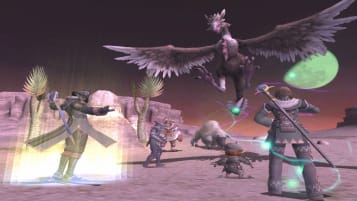
Hello! All this week we’ll be celebrating Pride and the power of positive representations in games. Every day we’ll be bringing you stories and insights from different parts of the LGBT+ community. You can also help support Pride with Eurogamer’s newly redesigned t-shirt – all profits from which will be going to charity.
Growing up I didn’t really have much access to LGBT+ content; it was the perfect mixture of a lack of queer media in all forms and a belief that, if I was lucky enough to find something, it wouldn’t be very good. The one game series I found that did allow me to express my sexuality was Harvest Moon (now called Story of Seasons.) The downside was that if I wanted to pursue a bachelorette, then I had to play as a male character, even when I could pick my gender. Later instalments in the series did have character customisation, but I’d have to sacrifice hours of gameplay simply to unlock this feature. It was, in essence, representation of my own creation and, no matter how hard I tried, it always felt rather hollow.
Playing Stardew Valley for the first time, I realised that I could finally experience every aspect of the farming role-playing genre without compromise. My plans for local business domination were no longer hampered, because, in this game, I could play as a lesbian farmer from the moment I inherited my grandfather’s farm. His ghost also didn’t have to wonder why I had spent the money he’d left me for turnip seeds on a haircut.

I felt represented in Stardew Valley and it furthered my immersion into the game world – I hadn’t just created a fictional character, I had recreated myself. Though I do still enjoy playing the old Harvest Moon games, like A Wonderful Life, I’m now even more aware of what, for me, they lack. Simply being able to express a fundamental part of myself changed my entire experience with a genre of games and it demonstrates why diversity, especially for the LBGT+ community, in gaming is so important.
It’s been wonderful to watch the rise of LGBT+ media; from web series to film to podcasts, which is definitely where the best queer representation currently is, but especailly in video games. There are games like VA-11 Hall-A where the protagonist’s queerness is seamlessly woven into their personal narrative or others, like Night in the Woods, which depict stable same-sex relationships. You can also find games that are solely focused around queer issues, like Gone Home, which is a particular favourite of mine. Exploring the Greenbriar family home, I’m reminded of how it feels to discover something so important about yourself and how terrifying it can be to reveal this knowledge to others. You don’t encounter any ghosts in Gone Home, but the house is still haunted.
Manage cookie settings
The Indie game scene has been, and remains, the best place to explore queer voices in video games, because it allows members of the LGBT+ community to speak freely and without the worry of corporate constraint. The triple-A market is, be it slowly, catching up. RuneScape released its first transgender NPC, Angof, in 2015, while Borderlands 3 has a variety of playable and NPC queer and trans characters. This includes Lorelei, who is non-binary and voiced by trans actor Ciarán Strange. Most recently, we’ve seen the release of The Last of Us 2, which sees Ellie taking on the role of lead protagonist.
Though, for me, the big release of the coming months is the remake of Friends of Mineral Town, the best Harvest Moon game, which finally includes same-sex marriage.




